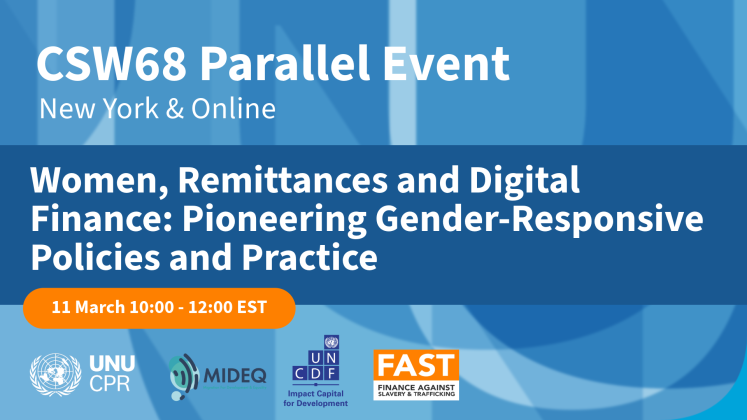On 11 March, the United Nations University Centre for Policy Research (UNU-CPR), United Nations Capital Development Fund (UNCDF), Finance Against Slavery and Trafficking (FAST) at UNU-CPR, and the Migration for Development and Equality (MIDEQ) Hub held a roundtable discussion on Women, Remittances and Digital Money: Towards Gender-Sensitive Policies and Practice. This event was part of a programme of parallel sessions organized during the annual two-week deliberations of the Commission on the Status of Women (CSW). A priority theme of CSW68 was accelerating the achievement of gender equality and the empowerment of all women and girls by addressing poverty and strengthening institutions and financing with a gender perspective.
Event objectives
This event brought together UN agencies, the financial sector, governments, academics, international organizations and civil society, to improve understanding of the remittances, innovations in digital money transfers, and investment opportunities using a gender lens with the aim of sharing good practices, resources, and guidance. It showcased new research from UNCDF and FAST highlighting the importance of understanding gender in order to maximize the community and development benefits of remittances and provide examples of pioneering gender-responsive policies and practice from a range of different contexts.
Specifically, the event focussed on:
Understanding gendered patterns of remittances, including gender differences in remittance transfer methods and investment decisions;
Learning the innovative design principles remittance service providers are employing to design for marginalized populations, including women;
Strengthening capacity and fostering partnerships for enhancing gender-responsive policy and practice in relation to remittances;
Identifying specific actions government, international organizations, the financial sector, civil society, and the private sector can take to ensure that policy and practice related to remittances is gender-responsive, including for survivors of trafficking and modern slavery;
Leveraging sex-disaggregated data to inform financial inclusion strategies; and
Ensuring that remittances contribute both to the realization of the Sustainable Development Goals and CSW objectives by strengthening institutions and financing with a gender perspective.

